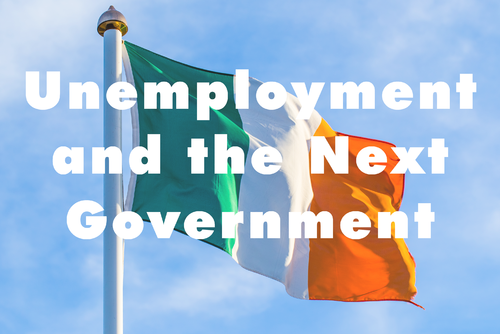In what now feels like another era, the Irish National Organisation of the Unemployed (INOU) published our election manifest for General Election 2020 on January 23rd, 2020. At that stage, the headline unemployment figures had considerably improved since the General Election in 2016. However, unemployment and its impact were still issues for a lot of people. Also there were particular challenges facing people who were distanced from the labour market because of their employment status, the area they live in, the community they are from, their family status, their gender, their age or that they have a disability.
These challenges have not gone away with the COVID-19 pandemic, they will be exacerbated by the unprecedented job losses as Ireland has locked down to try and manage this health crisis. The rollout of a more accessible and considerably improved social welfare payment in the Pandemic Unemployment Payment (PUP) is to be welcomed, in particular the acknowledgement that existing payments are inadequate to support people to meet their needs.
However, what happens when the crisis is over? The reality is that trying to manage on a ‘regular’ Jobseeker’s payment, while seeking a decent job, is a challenge that requires good supports and services. If the economy is slow to recover, which is increasingly likely, or has to be opened up slowly sector by sector, a lot of people will remain unemployed. Moreover, when they are moved from a PUP to a Jobseeker’s payment they will be facing significant loss of income.
To that end the INOU is calling on the incoming government to address particular issues under the headings of adequate income, supportive employment services, activation programmes, access to decent work, and community-based organisations.
Under Adequate Income
- Benchmark all Social Welfare rates at a level which is sufficient to lift people above the poverty line and provide them with a Minimum Essential Standard of Living.
- End the age segregation still evident in the Jobseeker’s Allowance payment.
Under Supportive Employment Services
- Resource the provision of good career and employment guidance to support unemployed people to make informed choices.
- Address the remaining barriers to work and further incentivise the take-up of work.
- Support people to address the initial costs of taking up employment, in particular the costs of travel and childcare.
- Ensure that individuals and communities most disadvantaged in the labour market are proactively provided with tailor-made supports to address their issues.
Under Activation Programmes
- Open up access to employment programmes for unemployed people signing on for credits.
- Ensure that unemployed people’s participation in employment programmes is by choice and that they are facilitated to gain good work experience and enhance their skills.
- Resource the provision of good advice and guidance to support unemployed people to access appropriate education and training.
- Acknowledge the cost of participation in education and training and support adult learners to meet these costs to facilitate their participation.
- Properly resource community groups in their work addressing the needs of people very distant from the labour market.
Under Access to Decent Work
- Ensure that decent work is at the heart of all employment and jobs policies.
- Plan for the full impact of Brexit on the labour market and ensure unemployed people and vulnerable workers gain access to a decent job.
- In planning for the increased digitalisation of work, ensure that unemployed people and vulnerable workers are supported to adapt and enhance their job prospects.
- Actively support the roll-out and attainment of the Living Wage.
- Fully support unemployed people seeking to address their unemployment through self-employment.
- Add socio-economic status as a ground into Ireland’s equality legislation.
Under Community Based Organisations
- Resource the development and maintenance of independent community based organisations and their work with people experiencing social and economic exclusion.
- Support the community and voluntary sector, an important entry point for people more distanced from the labour market, to play its part in meeting training needs and providing lifelong learning opportunities.
- Properly support ‘Deficient Demand’ social enterprises.
